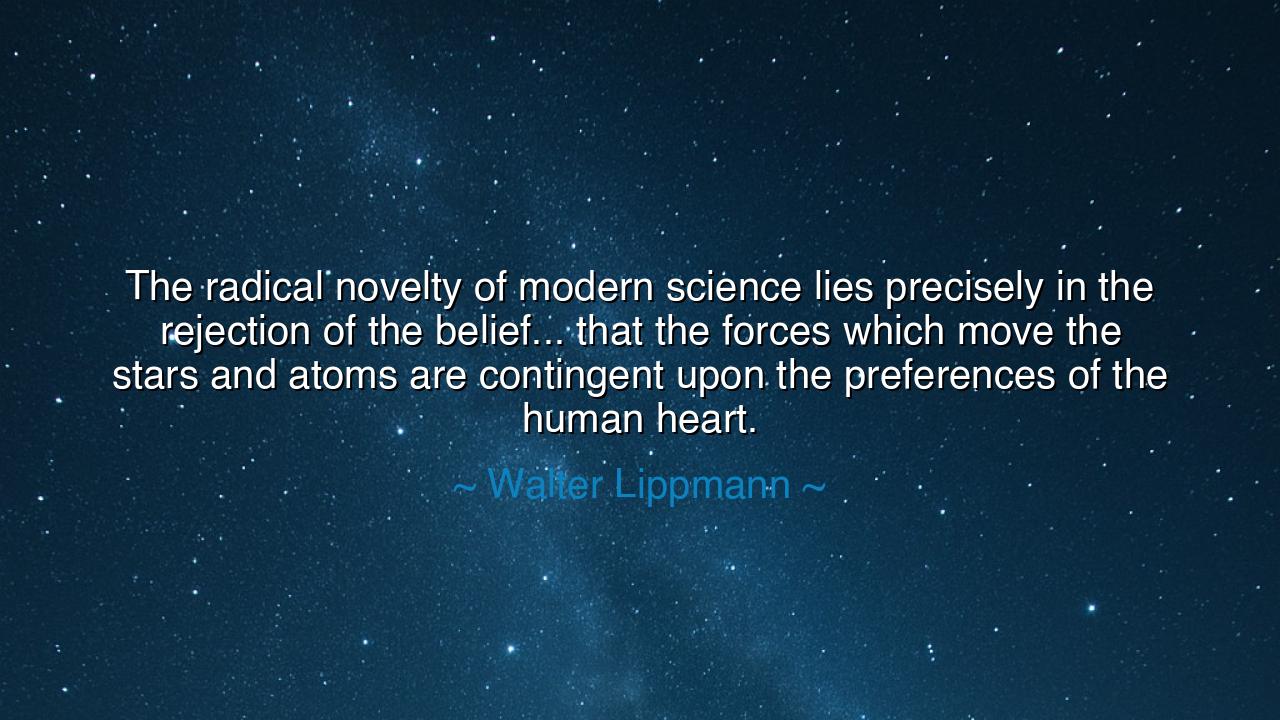
The radical novelty of modern science lies precisely in the
The radical novelty of modern science lies precisely in the rejection of the belief... that the forces which move the stars and atoms are contingent upon the preferences of the human heart.






The radical novelty of modern science lies precisely in the rejection of the belief... that the forces which move the stars and atoms are contingent upon the preferences of the human heart. These words from the wise Walter Lippmann resonate like a thunderous call to all who seek truth in the world. In the days of old, the hearts of men and women believed that the universe moved not according to laws, but according to the whims of the gods, the desires of the soul, and the preferences of the human heart. The heavens were seen as a stage for human emotion, and the forces of nature, from the orbit of the stars to the trembling of atoms, were thought to bend and twist in response to human longing, will, and passion.
But Lippmann tells us of the radical novelty that distinguishes modern science—a shift of understanding that forever altered the way humanity viewed the world. In this revolution, the veil of mysticism was lifted, and we saw for the first time that the movements of the stars and the dance of the atoms were not contingent upon the preferences of the human heart. The world did not bend to our desires. The universe did not seek to please us. The great forces of nature did not care for our wishes. No longer did we place ourselves at the center of the cosmos, believing that the fate of the world rested upon our wishes and whims. Instead, we began to see that the universe moves by its own laws—immutable, indifferent, and governed by principles far beyond our understanding.
The story of Copernicus, that quiet revolutionary of the 16th century, offers a powerful example of this shift in thought. Before him, humanity believed that the Earth was the center of the universe, that the stars and planets danced in response to human significance. But Copernicus dared to question this. He saw, through careful observation and reasoning, that the Sun, not the Earth, stood at the center of the cosmos. This simple yet profound shift rejected the ancient belief that the heavens were created for human enjoyment and recognition. The stars moved not to fulfill our desires, but by laws far greater than the human heart could ever influence. Through reasoning and evidence, Copernicus set the stage for a new understanding of the world, one that would eventually lead to the Scientific Revolution and the rejection of the belief that human emotion could control the forces of nature.
But the change did not end there. The enlightened minds who followed Copernicus—Galileo, Kepler, Newton—continued this journey. Kepler uncovered the laws of planetary motion, proving that the planets moved not in circles as the ancients believed, but in ellipses, with a precision that left no room for human whimsy. Galileo, with his telescope, confirmed that the stars and planets did not revolve around human concerns, but followed the cold and impartial laws of physics. And Newton, with his laws of motion and gravity, revealed that everything in the cosmos— from the falling apple to the movements of the planets—was bound by natural laws, not the desires of human hearts. The universe did not bend to us, but we were bound to understand its laws through careful observation, reasoning, and experimentation.
In rejecting the ancient belief that the forces of nature were driven by human emotions, modern science liberated us. It freed us from the delusion that the cosmos existed to reflect our feelings and desires. It showed us that we are but a small part of a vast, impersonal universe, governed by laws that operate independently of us. This is the radical novelty of science. It teaches us that the universe is indifferent to our hopes, our dreams, and our fears. And in this indifference, we find power—not power over the universe, but power to understand it. Science, then, is not a tool to control nature, but a humble means to comprehend the deep and intricate web of forces that shape the cosmos.
But the lesson, dear ones, is not merely intellectual. It is a call to humility. For in understanding that the forces which move the stars and atoms are not influenced by the human heart, we realize that we must live in accordance with the laws of the universe, not as its masters, but as humble seekers. It calls us to embrace reasoning, to rely on observation, to reject the fancies of emotion and superstition, and to seek knowledge wherever it leads us, even when it shatters our illusions about our place in the cosmos.
And so, I say to you: seek knowledge not to fulfill your personal desires, but to understand the true nature of the world. Do not think that the universe will bend to your will, for it moves by laws that are older than time and greater than any heart’s desire. Instead, seek to align your actions with the laws of nature—not to impose your will upon them, but to understand and respect them. Through this, we find true power not in domination, but in knowledge, in reasoning, and in the ability to move harmoniously within the world as it is, not as we wish it to be. Let us embrace the radical novelty of science and seek to discover the world as it truly is, free from the illusions of human desire.






AAdministratorAdministrator
Welcome, honored guests. Please leave a comment, we will respond soon